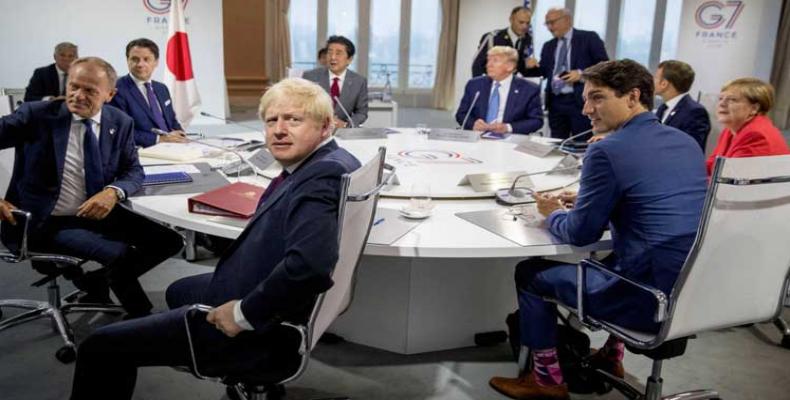Paris, August 25 (RHC)-- The G-7 gathering is taking place against a backdrop of concerns about a global economic downturn and coincides with an era of international disunity across an array of matters.
On this official Twitter account, Donald Trump writes: “Before I arrived in France, the Fake and Disgusting News was saying that relations with the 6 others countries in the G-7 are very tense, and that the two days of meetings will be a disaster.”
Trump then met with the new British Prime Minister Boris Johnson. Afterwards, Trump issued a statement: “We are having very good meetings, the leaders are getting along very well, and our country, economically, is doing great - the talk of the world!”
Tensions were quickly on show, however, as the first full day of talks between the leaders of Britain, Canada, France, Germany, Italy, Japan and the United States got underway in the Basque coast resort of Biarritz in southwest France.
Before leaving Washington Trump stepped up his tariff war with Beijing in a battle between the world’s two largest economies that has spooked financial markets, and "hereby ordered" all U.S. companies to move out of China.
Britain’s Johnson voiced concern on Saturday about creeping protectionism and said those who support tariffs “are at risk of incurring the blame for the downturn in the global economy.” Sitting across from Trump on Sunday, he said: “We’re in favor of trade peace on the whole, and dialing it down if we can.”
Looking to broaden the scope of the debate, French President Emmanuel Macron has invited several African leaders to discuss problems facing their continent, while leaders from India, Australia, Chile and Spain are due to attend a dinner on Sunday where the focus will be on the environment and other issues.
However, senior U.S. officials accused Macron of looking “to fracture the G-7” by focusing on “niche issues” rather than major global concerns. France denied this, pointing to Sunday’s initial session covering the economy, trade and security - areas that used to draw easy consensus but are now sources of great friction.
France said G-7 leaders had agreed that Macron should hold talks and pass on messages to Iran. However, Trump, who has pushed a maximum pressure policy on Iran, distanced himself from the proposal, saying he had not even discussed it.
Trump also appeared at odds with Japanese Prime Minister Shinzo Abe over the seriousness of North Korea’s series of short-range missile launches.
Trump, who prizes his relationship with North Korean leader Kim Jong-un, told reporters the launches did not violate an agreement and were in line with what others were doing. Abe, standing beside him, said they breached U.N. resolutions.
The missile launches have complicated attempts to restart talks between U.S. and North Korean negotiators over the future of Pyongyang’s nuclear weapons and ballistic missile programs.
There was also disagreement in Biarritz over Trump’s calls for Russia to be readmitted to the group of advanced economies. Johnson said G-7 leaders had a “lively” discussion about Russia and Trump, asked if his case for Moscow to be brought back into the fold had made headway, said it was a “work in progress”.
At the start of the day, Trump said Britain would have a major trade deal with Washington after it leaves the European Union. Asked what his advice on Brexit was for Johnson, he replied: “He needs no advice, he is the right man for the job”.
While the transatlantic rift is the starkest, there are also deep divisions within the European camp, with Johnson making his G7 debut at a time when he is struggling to persuade EU capitals to renegotiate Britain’s exit from the bloc, which Johnson has said will happen on Oct. 31 come what may.
Macron added to the internal EU strains by unexpectedly threatening on Friday to block an EU trade deal with a group of South American states over Brazil’s handling of fires that are ravaging the Amazon rainforest.
Germany and Britain both voiced deep concern about the fires, but said shooting down the ambitious Mercosur trade accord would not help save the Amazon.


